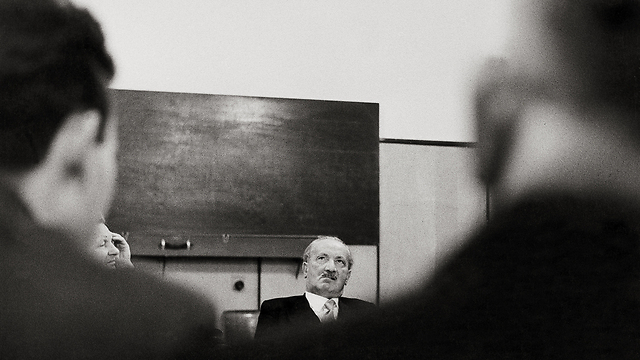
The black books of Martin Heidegger
Newly published diaries by the polemic German philosopher show that anti-Semitism played a larger part in his thinking than was previously known. How do academics in Israel and abroad deal with this new discovery, and can his philosophy withstand his problematic affinity to the Nazis?
Though Heidegger’s affiliation and even possible affinity to the Nazi philosophy is well known, the first three volumes of his notebooks reveal that anti-Semitism had had a bigger role than previously thought in his philosophical writings, and the news has sent scholars and fans scrambling.
The journals, written between the 1930s and 1960s, are a rare mix of philosophical and personal reflections spanning more than 1,200 pages. In the notebooks, Heidegger slams what he calls “World Judaism" and its influence on Germany. In another entry, Heidegger claims that the Jews had a "talent for calculation."
The editor of the notebooks and director of the Martin Heidegger Institute, Peter Trawny, told British newspaper the Guardian that he was “shocked” when he discovered the anti-Semitic passages roughly a year ago.
“Heidegger didn't just pick up these anti-Semitic ideas, he processed them philosophically – he failed to immunize his thinking from such tendencies”, Trawny told the paper.
Related stories:
In spite of the potential damage the revelations could cause to the philosopher's legacy, Trawny decided to go ahead with their publication, in the hope that the revelations would facilitate a constructive debate on Heidegger and his works.
Günter Figal, head of the Heidegger Society, cut to the heart of the matter: Though Heidegger's involvement with Nazi Germany was already known – as was the fact that he was enthusiastically supportive of what he called a national revolution – his reflections on Judaism and the potentially devastating role they played in his overall philosophical work were not.
In an interview with the German state radio Deutschlandradio Kultur a few months ago, Figal explained that some passages in the notebooks regarding Judaism were clearly anti-Semitic, indicating that Heidegger's brand of Jew hatred was philosophical at its core, and thus runs the risk of contaminating his now classic corpus.
Dr. Yaron Senderowicz, from the department for philosophy at Tel Aviv University, hasn’t yet read the notebooks, and he is not so quick to throw Heidegger’s philosophy out the window.
Although the notebooks show that Heidegger’s thoughts were clearly anti-Semitic, Senderowicz hypothesizes that anti-Semitism was not embedded in his thinking.
“I think that anti-Semitism isn't really there. We have the tendency to read his philosophy backwards”, he says. Nevertheless, Senderowicz adds, Heidegger clearly was a member of the Nazi party and identified with them during his tenure as head of the University of Freiburg.
Heidegger joined the Nazi party after the National Socialist movement took power in 1933, and expected nothing short of a "Restart of German Destiny" from them. During this time he became head of the University of Freiburg, and it was his expressed mission to convert the university into a new type of consciousness. Moreover, Heidegger never expressed remorse for his activities at that time.
Even though Heidegger’s character was questionable, he was undoubtedly a revolutionary philosopher and a greatly influential intellectual, Senderowicz says, and that students of Heidegger should make the distinction.
“You should separate a person from his ideas; you should differ between his philosophical and political ideas,"
Gideon Freudenthal, professor of philosophy at Tel Aviv University’s Cohen Institute for the History of Ideas and Philosophy of Science, agrees that one must distinguish between a person and his work.
“To practice philosophical ethics you don’t have to be a moral person yourself,” he points out. But with Heidegger that is not the case, he claims, even though he also hasn't read the notebooks yet.
But anti-Semitism has heavily influenced Heidegger's thinking. Freudenthal cites as proof a report that Heidegger wrote for the Bavarian Ministry of Culture in 1933. He was entrusted with writing an academic appraisal of Richard Hönigswald, a professor of philosophy at the University of Munich, who was born Jewish but converted to Protestantism some 30 years prior.
This report was one of the leading causes for Hönigswald’s expulsion from the university. In it, Heidegger mixes his philosophical outlook with Nazi terminology, conflating between his academic disagreements with Hönigswald and the latter’s Jewish roots.
Heidegger maintained that Hönigswald in particular, and the prevalent Neo-Kantianism philosophical movement to which Hönigswald was affiliated in general, took readers off-track, reducing human beings to pure thought and promoting a "universal world culture," that was blind to man's entrenchment in the historical tradition of their people (Volk), which itself originates in blood and soil.
According to Freudenthal, in this report Heidegger perceives Hönigswald as a Jew rather than a person, and expresses himself in a blatantly anti-Semitic fashion. He accuses Hönigswald of "dangerous and idle sophistry" and anti-metaphysical thought as opposed to "deep" (German) philosophy - anti-Semitic clichés prevalent at the time.
“I don’t know whether it was out of opportunism or conviction”, Freudenthal says, adding that Heidegger’s philosophical disagreements with Hönigswald were related to neo-Kantianism.
In many cases Heidegger’s opposition to the truly German philosophical tradition of Neo-Kantianism was rationalized by attributing Jewish qualities to it and its proponents. Such was partially also the case with Ernst Cassirer, one of the most prominent philosophers of Weimar-era Germany.
“You certainly cannot associate Heidegger’s philosophy with Enlightenment and democracy”, Freudenthal says, describing a famous public debate between Cassirer and Heidegger in Davos, Switzerland, in 1929. Cassirer was at the time a symbol of the old philosophy of enlightenment, which supported the liberal Weimar Republic.
Heidegger was an opponent of the Enlightenment. He represented the new and opposing "Sturm und Drang" philosophy, which was growing strong in Germany at that time at the expense of the budding republic.
“The contrast between their respective world views persists“, Freudenthal says, “some people refuse to understand this dispute as an allegory for the clash of Enlightenment and counter-Enlightenment." But the debate was organized with the intention of pitting two opposing world views against each other, showing a liberal Jewish philosopher and a folkish one.
He is no expert, Freudenthal stresses, but Heidegger’s philosophy certainly leans towards the irrational and anti-Enlightenment side. Heidegger’s philosophy, he summarizes, is fertile ground for nationalistic attitudes.
Despite his claim that the importance of the anti-Semitism in Heidegger’s notebooks is exaggerated, every time Senderowicz teaches Heidegger he opens with his problematic political views. For instance, Heidegger confessed his Nazi affinity as part of his lectures “Introduction to Metaphysics” in 1935, and in 1953 he published these words again. Even in the latter publication, he didn’t edit out the parts in which his views express a direct affinity to the Nazis, Senderowicz says.
On the other hand, he continues, he has never downplayed Heidegger’s questionable political views, and insists that a person's political ideas do not affect his theories. “This is my claim,” Senderowicz underlines, “there is no connection.” He predicts that the revelations will not greatly influence Heidegger's reputation.
“We are far beyond this point," he says. "I don’t think that any philosopher would stop teaching Heidegger because he was a Nazi.”











